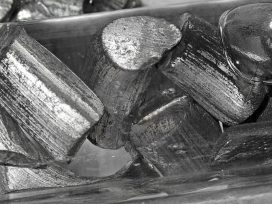 Jean Baudrillard and his wife Marine – an unassuming and approachable couple, not exactly the sort of people you would call arrogant, Parisian intellectuals. It was the spring of 2000 in Oslo. Disorganized as usual, I arrive half an hour late to take them to dinner. They stand there smiling, waiting for me in front of the French embassy. During the meal, I ask them about the present intellectual climate in Paris. Is it still characterized by past activists like Sartre, de Beauvoir, and Foucault, or is it better characterized by heated political discussions in cafes or the homes of well-known philosophers? Baudrillard and his wife shake their heads. He says that the years after the highly active 1970s and 1980s were more professionally driven, state intellectuals did not stray beyond the confines of their offices or their writings, hostility and arrogance bred division amongst them.
Jean Baudrillard and his wife Marine – an unassuming and approachable couple, not exactly the sort of people you would call arrogant, Parisian intellectuals. It was the spring of 2000 in Oslo. Disorganized as usual, I arrive half an hour late to take them to dinner. They stand there smiling, waiting for me in front of the French embassy. During the meal, I ask them about the present intellectual climate in Paris. Is it still characterized by past activists like Sartre, de Beauvoir, and Foucault, or is it better characterized by heated political discussions in cafes or the homes of well-known philosophers? Baudrillard and his wife shake their heads. He says that the years after the highly active 1970s and 1980s were more professionally driven, state intellectuals did not stray beyond the confines of their offices or their writings, hostility and arrogance bred division amongst them.
Now the last of the great French philosophers of the 1970s is dead, joining the ranks of Foucault, Lyotard, Guattari, Deleuze, and Derrida. Jean Baudrillard succumbed to cancer in March. To mark the occasion, we present an excerpt from a previously unpublished interview that I made with him at the time of his last visit to Norway in 2000.
Jean Baudrillard is probably the most significant media philosopher we have seen in recent years. A “prophet” whose hard-hitting descriptions and analyzes were validated by the emerging media society of the 1970s. It is no mere coincidence that it is Baudrillard’s “Simulations” that the character of Neo (Keanu Reeves) uses as a hiding place for a precious CD in the 1999 film The Matrix. Baudrillard himself was not a great media-consumer or IT geek, he used a typewriter for most of his life, avoided mobile phones, and subscribed to Bob Dylan’s “500 channels and nothing on”. But he knew what was happening. He noticed what was playful in us become functional; how sport, work, and leisure time have become structured and computer games do away with much of the charm of old-style team games. He noticed saw how it all went wrong for us adults: Baudrillard pointed out that we dream with our eyes open, thus explaining how wars such as the Gulf War seemed unreal to us, perceived simply as events on TV. We can recognize this also today, in the case of the Iraq war.
Who actually experiences war as real? The problem is that with our “TV shudders” and aestheticizing of the war’s catastrophic effects, we fall instead into a kind of amnesic trance, a realm of virtual responsibility where we consume experiences, absorb pain, and allow the TV screen to envelop us in a closed circuit. In this hyper-reality we stop experiencing with our bodies and essentially become symbol processors for these media machines. Such a game (or play, to refer to Guy Debord’s social critique) achieves prominence in our hyper-realistic world, where reality is a symbolic dimension that has broken away from the real. It is precisely the rules of the game, the room for manoeuvre, the opportunities, and the absurdities in this broken-away reality that Baudrillard tackles. He researched regimes of sign value and the unfeasibility of symbolic exchange in the late-capitalist system of production. He eventually turned away from Marxism – which still held on to use-values, needs, and shortages – and towards an analysis of media consumption. With Simulacres et Simulation (1981) he went even further by acknowledging that “reality is no longer possible”. Rather than criticizing illusion, he tried to dispel hegemonic symbols and images. Baudrillard’s style became more playful, seemingly exaggerated and provocative, in line with his self-declared, Nietzschean “active nihilism,” which aims to challenge a symbolic and material overproduction that has displaced reality.
A magnificent game
Truls Lie: How are we to understand the relationship between the playful game and the dominant value-regime’s insistence on production and consumption? One could of course say that today’s production satisfies a positive and playful desire to create. Even though there is overproduction of virtually everything, there may just be a “playful human” behind the scenes. You convey it as problematic that people play an active role in today’s overproduction, but why shouldn’t this be based on play, on a productive desire, as Gilles Deleuze would have it?
Jean Buadrillard: Think of it all as a magnificent game, where certain things come to represent more and more other things. Playing and games have several dimensions that have been categorized by the sociologist Roger Caillois: Mimicry (the game of representation), Alea (the game of chance), Agon (rivalry and competition), and last but not least, Ilinx, the vertiginous, delirious dimension inherent to some games. Our modern production, overproduction, and overabundance of communication and information correspond to a vertiginous, delirious game. This dimension is given a higher status than the others. Consequently, according to Caillois’ typology, we have a one-dimensional development of one category. We have to have a combination of all four dimensions in order to produce a really comprehensive game.
TL: You say somewhere that when desire has been satisfied, people experience a kind of mental death. To what extent is this an exaggeration and how do you understand the rhetorical function embedded in your style of writing?
JB: I am very aware of the paradoxical rhetoric in my writing, a rhetoric that exceeds its own probability. The terms are purposefully exaggerated. If truth does not exist, then we have to proceed behind the metaphysical scenario of subjects and objects. I like to explore in my writing what happens after the demise of different things and truths, and this can only be done through the use of thought experiments. Of course this is not a discourse on truth – not everything can be verified, there is no pretence about that. The same goes for the question of desire. To say that all desires are satisfied is nonsensical because desire as such cannot be satisfied, quite the opposite. But in this world of production, desire is at one and the same time productive and a means of satisfaction. Consequently we have lost touch with the whole concept of desire, desire as metaphor, desire as promise, as something that cannot be satisfied or made a reality. I don’t use the term “desire” very often. The term had its day in the 1960s and 1970s. I suppose it’s the same for me with the term “symbolic”. Many of these paradigmatic terms were coined for other eras. “Desire” still clings to the world of the subject. Even Deleuze thinks of desire within a sphere of production, albeit a different and higher type of production. Molecular production was a big step for Deleuze, but even this proliferation and fractalization of the term “desire” kept its original form and was never developed further. I like to explore in my writing what happens when something ends.
Postmodern?
Baudrillard, together with a range of other French thinkers, has often been presented as a leading postmodernist, with all the negative and misleading characteristics that the term implies. Right from the initial spread of postmodernism in the 1970s, the meaning of this term has always been ambiguous: An epochal term? Descriptive of a way of thinking? Or a kind of intellectual style connected to a certain approach and form of writing?
TL: How do you perceive “postmodernism”?
JB: I have nothing to do with it. I don’t know who came up with this term. It comes from architecture, doesn’t it? I never understood why I was supposed to be a postmodernist. But when it comes to the book Simulacres et Simulation, why not? It does not deal with a modernity that has a progressive finality or a technological development with clear boundaries that depicts an aftermath where nothing happens. We have always had simulation and simulacra, and perhaps also another level of virtuality. But I have no faith in “postmodernism” as an analytical term. When people say: “You are a postmodernist”, I answer: “Well, why not?” The term simply avoids the issue itself.
TL: Could the term “transmodernism” better describe our time?
JB: This is a far more interesting term. I am not the only one to use it, for example, Paul Virilio uses the term “transpolitical”. The term analyzes how things develop after the principles of political realism have disappeared. When this happens, we have a dimension where politics always has and always will exist, but it is not the real political game. What happens afterwards calls into play the same problematic, but is specifically connected to defined areas; we have transaesthetics, transeconomy, and so on. These are better terms than “postmodernism”. It is not about modernity; it is about every system that has developed its mode of expression to the extent that it surpasses itself and its own logic. This is what I am trying to analyze.
TL: Nevertheless, the age we live in has its labels or defining characteristics. You have written that the epochal characteristic of the romantic era was replaced by surrealism, which was in turn superseded by transparency. You describe transparency as a nihilistic situation. What kind of nihilism are we talking about here?
JB: I’m not talking about transparency in the sense that you see everything on television, but that television is watching you. It is all about reversibility, in the worst sense. It is about visibility, the total disappearance of secrecy. Everything has to be visible, not in a panoptical way where everything is visible to the naked eye. Transparency is more than just visibility, it is devoid of secrets. It is not just transparent to others, but also to the self. There is no longer any ontologically secret substance. I perceive this to be nihilism rather than postmodernism. To me, nihilism is a good thing – I am a nihilist, not a postmodernist.
For me, the question is precisely this: why is there nothing, rather than something? To search for nothing, nothingness or absence is a good type of nihilism, a Nietzschean, active nihilism, not a pessimistic nihilism.
Seduction and death
One can ask oneself why nothing should be something to search for. But when the norm is for children in Norway to have 500 things each and for the meaning of life for many to revolve around the purchasing of more and more new things – be it the latest mobile phone model or a designer staircase – then capitalist production may well benefit from someone like Baudrillard, someone who adopts defence mechanisms against this type of overproduction. One of two defence mechanisms Baudrillard adopted was, remarkably, his fascination with seduction. In an overstated and overproductive consumer world, seduction has a quality that leads away or pretends – a counterweight to capitalist production that simply puts forward and presents. The other defence mechanism was directed at a subject-centred way of thinking, at theories that assert the freedom and autonomy of the subject. Baudrillard referred to the world of the object. This is something he also did in Oslo in 2000 when he exhibited his photographs of a range of objects and surfaces caught in the trap of objectivity. In the resistance put up by things, Baudrillard found a counterweight to restrictive control – in unpredicted events, in stock market crashes, computer viruses and AIDS: where the world changes course and phenomena speak their own language.
Baudrillard was also concerned with the relationship between symbolic exchange and death – the title of his 1976 book. Here he develops an array of themes from Georges Bataille and the aforementioned Caillois in the context of production and destruction as mutually dependent forms of exchange; language production and the dissolution of meaning; life and death. At one time, these lent a comprehensive shape to existence, but they have lost their relevance. Reality is absorbed in a fluid hyperreality, which gives finality and the limitations that are set by death a completely new kind of uncertainty. But where does Baudrillard himself stand on death?
TL: The director Ingmar Bergman once said that when he is dying, he does not want to be a vegetable in a hospital bed, but would like to control the process of his death, to avoid becoming a thing. You have written extensively about death. Have you formed any thoughts about your own death?
JB: I would say that it remains an issue very much connected to disappearing. There has to be an art of becoming visible as well as an art of disappearing. Disappearing cannot be a factual coincidence; it has to be an art. This can have several facets in writing or in drama. There may be an art to the biological aspects too, a seductive way of leaving the world. If it’s a complete accident, it’s a negative death.
TL: The French philosopher Michel Foucault died of AIDS. Was that a type of art of disappearing? What do you think about the way he disappeared and the legacy he left behind? Has he really disappeared as long as his work lives on?
JB: He clearly accepted the challenge of death. He knew the risks and made a choice. In a sense, this is another way of disappearing. He used the art of discretion, a safeguarding of confidentiality that was incredible – without in any way claiming that this is a good way to withdraw from the world! I would say that part of disappearing is to disappear before you die, to disappear before you have run dry, while you still have more to say. Many people and intellectuals are already dead but continue, unfortunately for them, to speak. This was not the case with Foucault.







